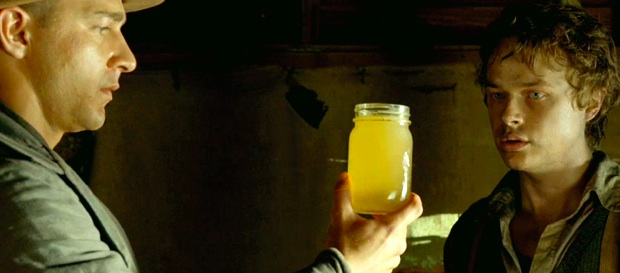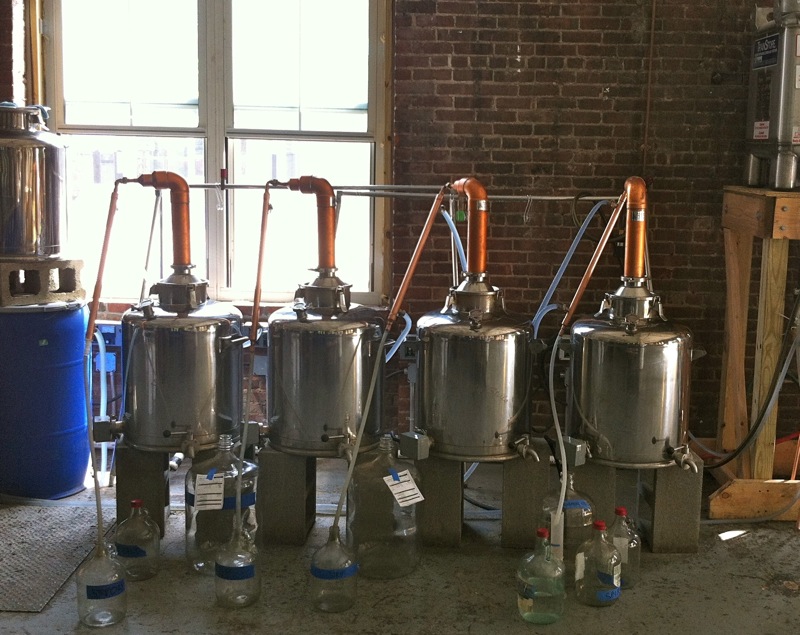
The Prohibition era, spurred by the ratification of the 18th Amendment back in 1920, ended nearly 80 years ago. The images from that dark moment in American history continue to stick in our minds: mason jars, gulping down liquor, cops axing barrels, moonshine pouring into the streets, the occasional gangster tommy gunning his way out of a sticky situation — it’s easy to picture.
The new movie Lawless pulls back the curtain on the era, exposing the bloody violence and luxuriating in the poetic experience of distilling one’s own moonshine. Today, the years of Prohibition feel otherworldly, like fiction. But while the government’s Constitutional mandate eventually dissipated and the riled up citizens cooled down, the sentiments of the times never really began or ended with Prohibition proper. America has always regulated alcohol, even to this day, and the people of the country have always had that curious desire to whip up their own batch for fun — legal or not.
In fact, modern moonshining is a reemerging art. And Colin Spoelman, founder and master distiller at Brooklyn’s Kings County Distillery, is at the forefront. “I grew up in a dry county, where the sale of alcohol was explicitly prohibited and has been since before Prohibition,” says Spoelman, whose moonshine operation is 100 percent legal and also holds the title of being the oldest distillery in New York City, founded in 2010. But the legal activities were spurred by current alcohol laws. “My dad, a minister now retired, would be fairly critical of ‘bootleggers,’ who in practice weren’t moonshiners so much as people who were going to Virginia to buy packaged alcohol and resell it to anyone willing to buy it. So when I was in high school, we would go up to Pine Mountain and buy Zima or something called ‘Mad Dog,’ which was just cheap, commercially available booze. That said, you can find moonshine if you wanted.”
Prohibition in the extreme doesn’t exist today, but alcohol bans and restrictions continue to exist on country-wide and state levels. Patrons don’t have to sneak into speakeasy to drink a Jack and coke, but the laws still stand in the way of complete alcoholic freedom: High-proof alcohols (such as Everclear) are restricted or illegal; wormwood-infused absinthe, legal overseas, is banned; states continue to restrict from who, when, and how you can purchase liquor; and most recently, the FDA declared that drinks that combined caffeine and alcohol must be removed from shelves (farewell, Four Loko). Modern “moonshine” teeters a thin line.
 “Moonshine can mean illegally made alcohol or it can mean an unaged or ‘white’ spirit, most commonly corn whiskey,” Spoelman says. “It’s illegal to make your own spirits anywhere in this country. So anyone making anything harder than beer or wine at home is breaking the law, and is moonshining. This was true even before Prohibition, and there were moonshiners long before 1920.” Spoelman recalls a time when 65 – 75 percent of the government’s income came from alcohol taxes. It was a proto-Prohibition, campaigned by Alexander Hamilton in his Federalist Papers throughout America’s infancy. Hamilton wrote in the 12th paper, “There is, perhaps, nothing so much a subject of national extravagance as these spirits.” The heated debate has always been around; Prohibition just saw it explode.
“Moonshine can mean illegally made alcohol or it can mean an unaged or ‘white’ spirit, most commonly corn whiskey,” Spoelman says. “It’s illegal to make your own spirits anywhere in this country. So anyone making anything harder than beer or wine at home is breaking the law, and is moonshining. This was true even before Prohibition, and there were moonshiners long before 1920.” Spoelman recalls a time when 65 – 75 percent of the government’s income came from alcohol taxes. It was a proto-Prohibition, campaigned by Alexander Hamilton in his Federalist Papers throughout America’s infancy. Hamilton wrote in the 12th paper, “There is, perhaps, nothing so much a subject of national extravagance as these spirits.” The heated debate has always been around; Prohibition just saw it explode.
Amazingly, Prohibition didn’t put an end to the tug of war between America and alcohol either. When author Matt Bondurant returned to Franklin County, Va., to research his book The Wettest County in the World (the source material for Lawless), he discovered that Prohibition mentality was still alive with the population. His grandfather and the central figure of Lawless, Jack Bondurant, was one of many players in Franklin County’s moonshining industry — a booming empire that helped earn it the title Bondurant borrowed for his book — but revisiting Franklin, Boundurant saw very little had changed. In an essay about his trip, Boundurant writes, “You could spend years there and never see it, even as it is all around you… It is a kind of secret world, a shadow behind the neatly mowed lawns and shining tobacco greenhouses. The people of Franklin are some of the friendliest people I’ve ever met, but there are things that they won’t talk about, and that you will never see.”
When Spoelman first started distilling his own moonshine whiskey, he introduced his product to Brooklyn natives who immediately took to the drink. “The first stuff was really harsh, but people encouraged me to go for taste. Gradually it got more refined and became a nice unpaged whiskey as opposed to high proof rocket fuel.” The popularity forced Spoelman to consider the legal implications of his homemade concoctions. “Once I’d learned to do it, then we decided that maybe it would be best to get a license. I had people asking if they could blog about my moonshining and that’s when I realized I could really get in trouble if word got out too far.”
The grey zone in whiskey production comes from “the proof,” an archaic term that’s evolved into alcohol per volume numbers. Prohibition era whiskey was around 190 proof (95 percent alcohol). Spoelman’s moonshine is a great-grandson of the historical formula. “Moonshine is not really a legal word in the eyes of the law,” says Spoelman. “You can call something moonshine if you want — it has no official meaning in the classification of types of alcohol set down by the government.  Whiskey is very highly regulated as to what you can call whiskey and what you can’t. The moonshine that we make is fairly traditional as unpaged whiskey, but a lot of illegally made alcohol has white sugar in the mash, which gives you a higher yield, though at the expense of taste.”
Whiskey is very highly regulated as to what you can call whiskey and what you can’t. The moonshine that we make is fairly traditional as unpaged whiskey, but a lot of illegally made alcohol has white sugar in the mash, which gives you a higher yield, though at the expense of taste.”
Spoelman isn’t the only person in America producing his own moonshine, but he might be one of the few doing it within the tight restrictions of the law. A New York Times report from 2000 investigated the Appalachia moonshine circuit, which is still thriving today. According to the article, today’s illegal moonshiners utilize 800 to 1,000-gallon stills (compared to the 50-gallon stills used during Prohibition) and produce over hundreds of thousands of gallons of moonshine a year that are shipped to bars up and down the East Coast and sold for around three dollars a gallon. “It’s hard to imagine a society that doesn’t regulate alcohol, perhaps as hard to imagine as a society that doesn’t consume it,” Spoelman says. “I don’t think the regulations generally are a problem, but outright prohibition doesn’t work. It would seem that history has taught that lesson and yet it persists.”
Finding the right balance between freedom and restriction is a quagmire for every situation. Even while outright banning certain practices and beverages, America might be in the sweet spot. It’s easier to see how a country could be pushed for stricter laws — currently, Kenya and India are suffering from an illegal alcohol production scene that is routinely killing hundreds of people, thanks to contamination. Opening up the floodgates here in the states could result in that same hysteria.
The difference between Spoelman’s production and the hundreds of illegal operations in existence is that the founder of the Brooklyn distiller aims for taste. Moonshine was enjoyed during Prohibition — you can see the Lawless boys take great pride in imbuing their product with a hint of fruit and pouring it for those looking to have a good time — and as innovators like Spoelman continue to tinker with the formula, the white whiskey only becomes a larger staple of bar menus. “I think most of the interest in our moonshine comes from whiskey drinkers that want to know what the raw spirit tastes like. But there’s also a group that are getting sick of vodka and want something with a little more flavor that isn’t quite as heavy as whiskey. So we fall in to that category. Of course, there’s just people who want to sip something and get rowdy and I’d say we’re just as good for that.”
The spirit of Prohibition is very much alive thanks to the Internet, an endless repository of information that Spoelman admits is “a pretty terrible source when learning to do much of anything, but there are forums that are moderately helpful” when it comes to moonshine distilling. People are taking alcoholic matters into their own hands, and some, like Spoelman, come out on the right side of the law. But as long as there are laws, they’ll be broken. One day, we’ll watch the movie about the guy who spent years perfecting homemade Four Loko in his basement.
[Photo Credit: Weinstein Company, Kings County Distillery]
Follow Matt Patches on Twitter @misterpatches
More:


